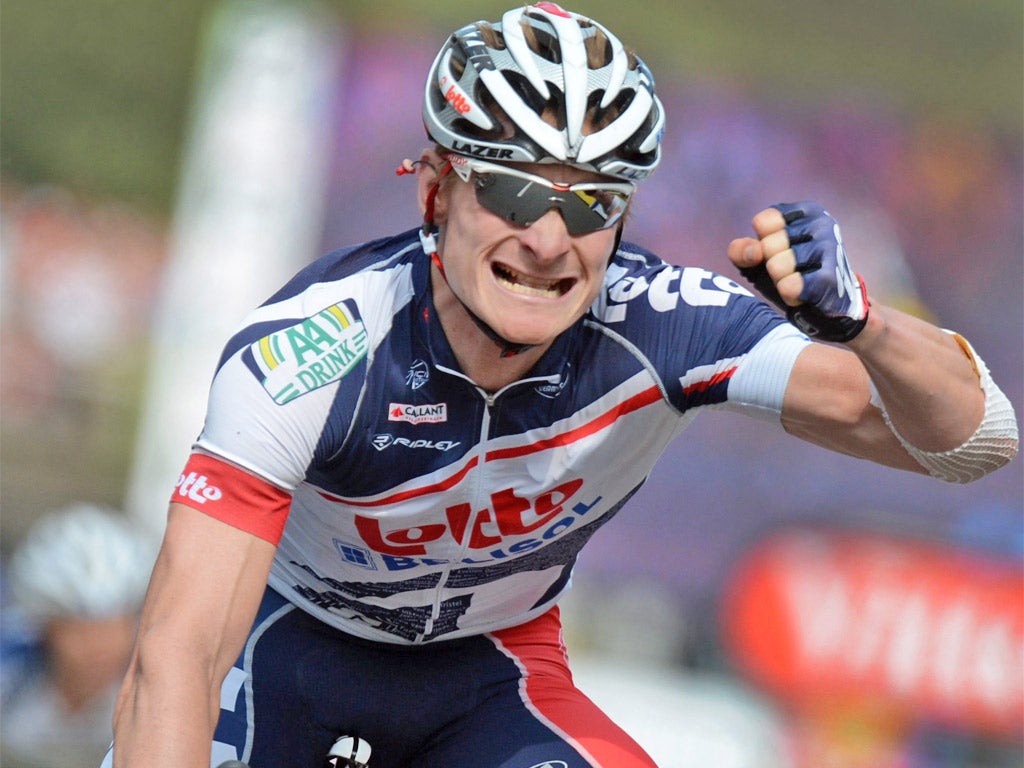The Independent's journalism is supported by our readers. When you purchase through links on our site, we may earn commission.
Medal spotlight on Germany: Out to spoil Great Britain's party but expectations are at all-time low
Spotlight on the main medal contenders: Greipel versus Cavendish is one of several head-to-head clashes with the hosts to savour

This is how the London Olympic script has been written. Around four o'clock on Saturday afternoon, Mark Cavendish will be ushered into the Mall by Bradley Wiggins and his team-mates and sent on his way to claim the host nation's first gold of the Games. It will be the beginning of a British gold rush. Just so long as the Germans don't get there first.
The familiar black, red and yellow colours of the Bundesflagge have been apparent in the Olympic Village since the weekend, draped over balconies in their corner of the athletes' accommodation. Were it to be raised in sight of Buckingham Palace on day one of London's Games it would be the mutter and vater of all party poops.
Andre Greipel is the man predicted to provide one of the sternest challenges to Cavendish's hopes of claiming the gold he missed out on in Beijing. The Germans have possibly the strongest team in the field including two former world time-trial champions, Tony Martin and Bert Grabsch. With their support, Greipel took bronze, behind Cavendish's gold, at the World Championships last year.
The Manxman and the rider from Rostock in the old East Germany have history. Cavendish usurped Greipel's standing as the main man at T-Mobile and it was not until last year that the German, by now with Lotto, snatched his first Tour de France stage, beating Cavendish, of course, by inches. Greipel, with a team built around him, won three stages in this year's Tour, but was nowhere to be seen when Cavendish swept to victory in Sunday's final stage.
The battle of Box Hill – the circuit's main climb – is potentially the most dramatic of a number of British/German head-to-heads that will go some way towards determining which nation will hit its target. Martin pulled out of the Tour early to ensure he is in shape for the time trial – he will certainly be fresher than Wiggins.
Both countries are chasing a clean sweep of the equestrian events – with Britain probably marginal favourites – while the rowers will be significant rivals in a number of high-profile races at Eton Dornay, in particular a heavyweight encounter in the men's eight in which the Germans are current world champions.
In the pool Britta Steffen and Paul Biedermann will be in contention for freestyle medals. Biedermann, the world record holder at 200m and 400m, is one of a clutch of fast men looking to make the podium in what will be one of the most competitive disciplines in the Aquatics Centre.
But this is not a German team expecting the spectacular in London. The ambitions set out by the German Olympic Committee, the DOSB, are no more than to hang on to what they achieved four years ago. "Beijing is the reference point, [but] many countries are investing in high-performance sport," said Michael Vesper, director general of the DOSB. "It won't be easy to defend fifth place."
The 392-strong German team will be the smallest the country has dispatched to a Games since reunification in 1990. The first Games after east and west had been brought together again were in Barcelona in 1992, when they finished third in the medal table. But since then the rest of the world has caught up, and state funding has been maintained at previous levels. In Beijing, the Germans won half as many medals as their total of 82 in Barcelona – and only one, a bronze in the women's javelin, in track and field – but the 16 golds were the best return since 1996. There has been criticism of the DOSB for how Olympic sport in the country is run and funded. It has led to a number of defections, most notably to Britain, with the decision of Philip Hindes to switch his allegiance to the better-funded and better-coached GB cycling set-up. Hindes was born in Germany but has a British father and will now lead off Chris Hoy and Jason Kenny in the team sprint.
The Germans have lost a number of coaches too – Britain was again the beneficiary when Jürgen Grobler crossed the Channel to become rowing's head coach – and the Olympic authority's apparent refusal to address the problem directly is starting to grate with some athletes.
Earlier this month Imke Duplitzer, a fencing silver medallist in 2004 and back in the team for London, launched an extraordinary attack on the DOSB. "The performances are getting worse and worse, because the system is completely broken," said Duplitzer. "After these Olympics we're going to have a huge problem raising new talent. We already have a massive coach problem. Our coaches are running away, because they can earn a lot more in other countries and have better conditions. No one wants to open their mouth, because they don't want to be thrown out of the support system."
German athletes, she added, should be accorded more respect and more support and not briefly lauded every four years "just because we hold the flag up at the Olympics a bit".
Subscribe to Independent Premium to bookmark this article
Want to bookmark your favourite articles and stories to read or reference later? Start your Independent Premium subscription today.

Join our commenting forum
Join thought-provoking conversations, follow other Independent readers and see their replies